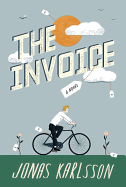
The absurdities of life coupled with the strangely surreal are hallmarks of Swedish actor and playwright Jonas Karlsson's work (The Room). His second novel, The Invoice, again turns on a Kafkaesque premise: a nameless, 39-year-old part-time video store clerk and film aficionado--a loner with only a handful of friends, whose most notable indulgence in life is having a pizza and taking in a movie in his one-room Stockholm apartment--receives a bill for 5.7 million kronor (roughly $875,000) in the mail. Thinking the bill--imprinted with a nondescript logo--is a mistake or a scam, the narrator disregards it. The next month, he receives another bill in the same amount, but with a surcharge of 150 kronor tacked on as a late payment. When the narrator calls to inquire, he makes matters worse as it is soon discovered that he owes even more than originally calculated. "What am I supposed to be paying for?" the narrator asks. "Everything," says the representative. "Being alive costs."
Through a cryptic, engrossing storyline that snowballs with staggering, thought-provoking complications, Karlsson reveals more about his underachieving hero. It seems contradictory that the hefty "happiness tax" in the whole country should be imposed upon someone living such a simple life. Fair or not, this leaves the narrator to scramble for deductions in the form of disclosures about free-floating anxiety, missing his parents and the loss of a secret love. The satirical, philosophical nature of this story delves into the meaning and purpose of life, how we measure joy and what truly constitutes a sense of accomplishment. --Kathleen Gerard, blogger at Reading Between the Lines

